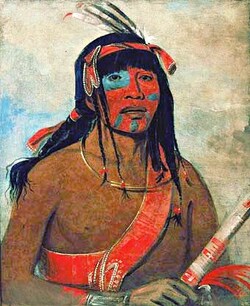 In the spring of, 1860, Charles Grant was encamped with a party of Ojibwe and Metis hunters on the Mouse River. In the middle of the night, twelve horses were stolen. No trace of the horses could be found. Later that summer, a party of thirty-six Yankton Dakotas arrived at St. Joseph with the stolen horses for the purpose of returning them in honor of the Sweet Corn treaty. The delegation with the stolen horses arrived, opposite St. Joseph about two o'clock in the afternoon on June 10th; they immediately crossed the river to return them. Unfortunately a large party of Ojibwe warriors fired on the Dakota, who were in the act of entering J.B. Wilkie’s home to surrender the horses officially. Under fire, the Dakota took possession of the house, removed the "chinking" from between the logs, and returned fire. During the heart of the battle, Mule – the son of the Red Bear – was shot three times in an attempt to enter the house to end the stalemate. Once at the door, he struggled to his feet, but he was stopped at the threshold by one of the Dakota who cleaved his head through to the chin with an axe. The firefight lasted until midnight. A constant barrage of bullets was kept up between the Indians up until the very end. At midnight, the Dakota finally fled the house and rushed about two hundred feet to the river, and were compelled to wade across the river on foot. When the fighting stopped, six Ojibwe, three Dakota, and two Assiniboine were killed. Wilkie's daughter was severely wounded in the thigh by an arrow. The Sioux left behind them thirty-two horses, (in addition to the twelve stolen ones). The Ojibwe cut up the bodies of their foes and burned them. The Metis had refrained from taking any part in the fight and afterwards sent emissaries to the Dakota at Devils Lake to assure them they still honored the treaty. The Dakota accepted their peace, but promised that they would return to settle accounts with the Ojibwe in numbers like the mosquitoes. In response to this brazen escalation in hostilities, the US Congress appropriated $50,000 for the erection of a fort at Pembina River to help keep the peace. Source: July 12, 1861, (Page 6) of the New York Times: An Indian Fight.; BATTLE BETWEEN THE SIOUX AND CHIPPEWAS.
1 Comment
|
ArchivesCategories
All
|
 RSS Feed
RSS Feed
